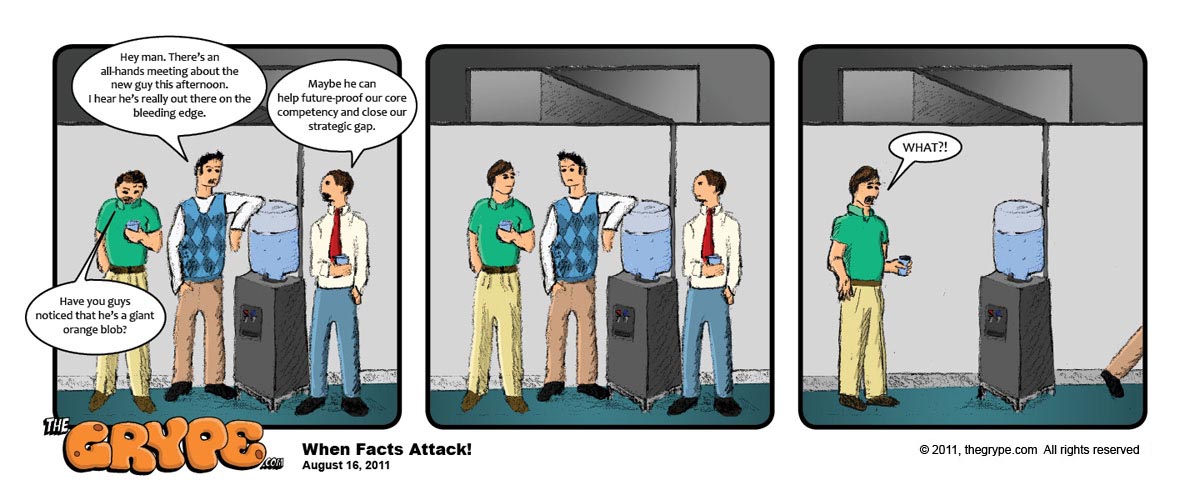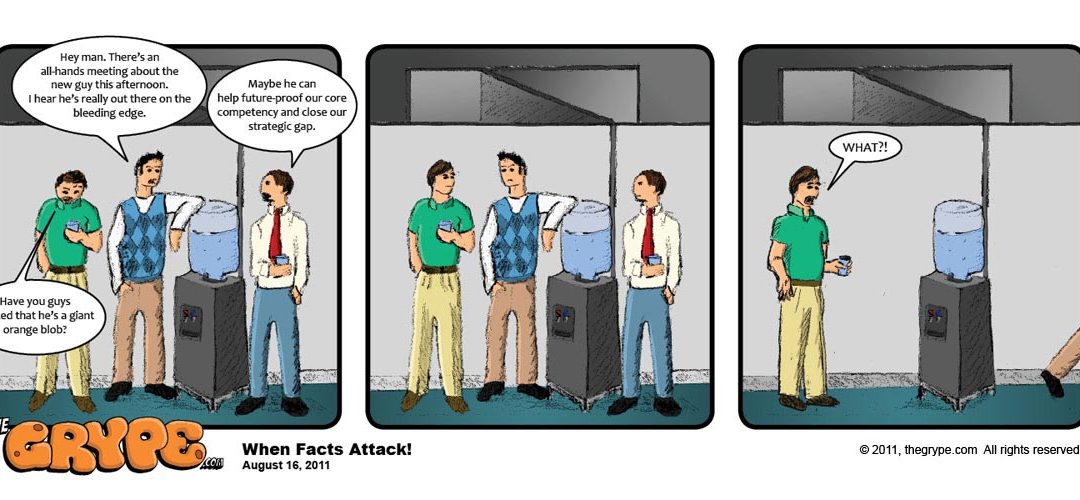 Conversation was once considered an art form unto itself, but lately it seems harder to figure out what people really mean based on what they say. Our language continues to morph and meld into a towering lexicon, a crushing juggernaut of words packed with cultural slang and customized behavioral terminology which seems poised on the brink of fracturing into something nonsensical.
Conversation was once considered an art form unto itself, but lately it seems harder to figure out what people really mean based on what they say. Our language continues to morph and meld into a towering lexicon, a crushing juggernaut of words packed with cultural slang and customized behavioral terminology which seems poised on the brink of fracturing into something nonsensical.
Slanguage (otherwise known as slang, vernacular, lingo, jargon, or patois) is a special vocabulary particular to a group that shares a field of interest or engages in some kind of mutual endeavor. The specific terms used by such a group are essentially a form of topic-specific verbal shorthand. The military is especially notorious for appropriating (or would that be requisitioning?) elements of language for its own use, creating specific terminology, code words, purpose-specific contractions, and an ever-increasing array of wacky anagrams. Don’t believe me? Just ask an AWOL military serviceman for his current SitRep and request a detailed After Action Report from him explaining why it’s SNAFU that everything is FUBAR.
That process of redefinition and re-tasking language proliferates in our expanding digital information super-culture. Each new emergent technology generates its own terminology to explain itself. The hyper-specific technobabble in use by ranks of IT Professionals is an ever-expanding mix and match of freshly-minted new words, swapped or fused with yesterday’s obsolete tech-speak to define new processes and concepts. Fresh waves of tech-savvy internet denizens adopt and adapt their own phrases, blending them with pop-culture references and computer-game-specific inside jokes, creating yet another flavor of digital slang. These days every subculture has its own tribal code whereby one tribe member identifies another, and improvident misuse of it can result in tribal castigation or even banishment. Weirder yet, many such online-isms have now crossed back into the analog world via phone tech and digital messaging, and suddenly your grandma is LOLing at you during the family reunion for getting PWNED by your sister-in-law on Facebook.
The business world is equally prolific in generating its own vocationally-specific corporate lingo. Paradoxically, a lot of that slang seems intended to disguise or misrepresent the actual meaning of the term itself, creating an oddly-Orwellian form of Corporate DoubleSpeak in which one uses a term to mean one “thing” when it actually means another (sometimes diametrically-opposite) “thing.” As if our cultural mania for politically-correct, hypoallergenically inoffensive speech has created a language vacuum that cries out to be filled with the linguistic equivalent of nutritionally-bankrupt junk-food.
At the pinnacle of this great virtual garbage heap of verbal bombast dwells the subtlest linguistic ninja, deceptively masquerading as a hyper-efficient cutting-edge communications tool defining the great business concerns of the day (but which is actually just a narcissistically self-referential, pithy verbal mash-up defined purely by trend and usually devoid of any real linguistic substance). I’m talking about— of course— the obnoxious corporate BUZZWORD.
A quick peek at thesaurus.com reveals that the term “buzzword” is formally considered synonymous with such descriptive terms as “balderdash,” “rigmarole,” “bunk,” “drivel,” “gibberish,” “mumbo jumbo,” and the ever-popular “twaddle.”
Which makes perfect sense. My definition of “buzzword” is any word or phrase extolled for its cleverness among a certain group of people (usually the corporate set), ultimately becoming so ridiculously trendy it gets overused and becomes a meaningless waste of sound and air tossed about by poseurs trying to sound more knowledgeable and important than they actually are. Particularly odious examples include “coaching the idea,” “core competencies,” “game changer,” “matrix management,” “touchpoints,” “drilling down,” “synergization,” “mature on-boarding,” and of course the ever-ubiquitous “thinking outside the box.”
Downsizing means “firing people.” Rightsizing, though friendlier-sounding, ALSO means “firing people.” And the cute little anagram “RIF” actually stands for “Reduction in Force,” which STILL means “firing people.” Except it means firing a LOT of people, all at once. Sure— companies have to control costs and sometimes that means people get fired. But why all the obfuscation? The word “fire” is ALREADY a euphemism. Why candy-coat it with more useless layers of empty verbal shrink-wrap?
There also seems to be a strange compulsion among the particularly vapid and vacuous to engage in a constant game of conversational oneupmanship in which everyone unceasingly tosses barrages of catch-phrases and buzz-words at one another in an apparent effort to score points by using the greatest variety of hip, trendy sayings and obscure cultural references. Taken too far, it renders meaningful communication essentially impossible: one cannot rationally discuss the serious side of life via witty—though-irrelevant— Gilligan’s Island sub-references or thinly-veiled Goonies metaphors. Nor does our language become magically more expressive if we nonsensically reformat its nouns and verbs into an alphabet soup of hyper-procedural gamer-jargon or cutesy pseudo-teen-speak. Juno was a cute movie—now please move on.
Even “zeitgeist”— itself a very cool, very old 18th century German word revived and injected into our modern vocabulary a few decades ago to describe the type of overriding cultural climate that gives rise to such trends— has ITSELF been misappropriated by the cult of buzzword and catch-phrase-spouting ranks of wannabe intelligentsia and drained of any real meaning through rampant overuse. It used to mean something important. These days it’s just another brand of designer espresso.
Sure—the Dude abides. Our cultural roots run deep, and they inform our communication with one another. But the plain truth is that—despite the trends of fashion or style or cleverness— our words only ever wield the power of the thoughts and concepts they express: no more, no less.

